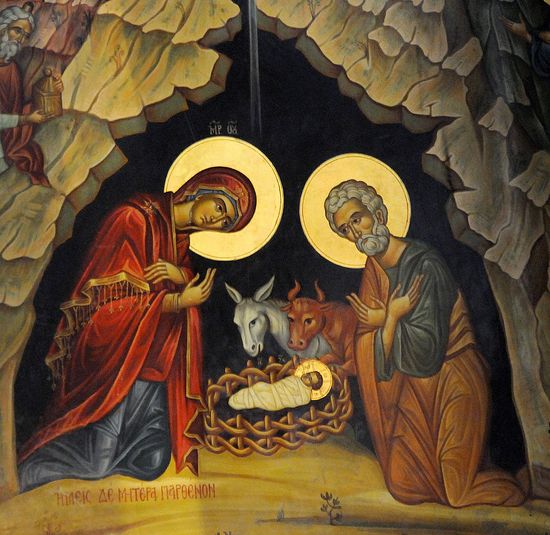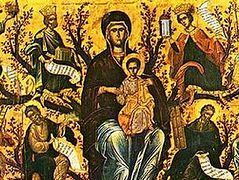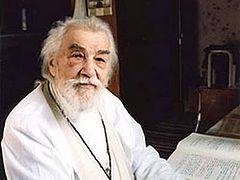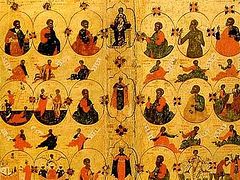On the eve of the Nativity of Christ the holy Church concludes its preparation for the great feast of the Nativity of our Lord, God, and Savior Jesus Christ. Several paroimias[1] are read at the evening service. Here are some of them.
Micah 5:2-4: But thou, Bethlehem Ephratah, though thou be little among the thousands of Judah, yet out of thee shall he come forth unto me that is to be ruler in Israel; whose goings forth have been from of old, from everlasting. Therefore will he give them up, until the time that she which travaileth hath brought forth: then the remnant of his brethren shall return unto the children of Israel. And he shall stand and feed in the strength of the Lord, in the majesty of the name of the Lord his God; and they shall abide: for now shall he be great unto the ends of the earth.
This paroimia, read during the First Hour of the Royal Hours service, is dedicated to the prophecy of Micah about the birth of Christ in the city of Bethlehem.
Bethlehem, one of the oldest cities, was the hometown of King David. It’s located 6.5 versts [4 miles—Trans.] to the south of Jerusalem. It was originally called the House of Ephratah because one of the founding fathers of the city was Ephratah, the great grandson of Judah (1 Chron. 4:1-4). The city was insignificant in terms of population size, but it was precisely there that the Savior, the Messiah was to be born. They awaited Him not just as king, ruling over His people, but as a deliverer, Who would unite those who dream not of an earthly dominion, but who are able to see in Him the messenger of God, to Whom is given the Kingdom over all men. That he was born in the ancient land of King David is a special joy for all who awaited His appearing. All believers will be one flock with one Shepherd. He will be standing guard, vigilantly ensuring that no one gets lost or falls behind. He will protect and defend His flock, and therefore, for those faithful to Him, it will be a joy to live with Him and to share in His glory and majesty. In the end, He will vanquish all resistance and will shine “even unto the end of the world.”
The Nativity of the Savior had been foretold by the prophet 700 years prior, that the people might live with hope. This prophecy is read at the First Hour and at Vespers, where it is joined by a few lines about mercy for the “daughters of Zion,” that is, for all the Israelite people. For infidelity to God, this people will be scattered, as the wind scatters broken branches, but afterward the Lord will take pity upon them (if the people humble themselves and repent), and save the faithful remnant. But this applies not just to the Jews, but to all who believe. Faith in Christ grants the right of the chosen people to all, and therefore it refers to the New Israel, that is, the Church of Christ. The “remnant,” that is, the spiritual heirs of the Israelites who were faithful to Christ, together with the peoples who believe in Christ, make up the Church, against which the gates of Hell will not prevail because Christ Himself will protect and defend it.
Isaiah 7:10-16, 8:1-4, 8-10: Moreover the Lord spake again unto Ahaz, saying, Ask thee a sign of the Lord thy God; ask it either in the depth, or in the height above. But Ahaz said, I will not ask, neither will I tempt the Lord. And he said, Hear ye now, O house of David; Is it a small thing for you to weary men, but will ye weary my God also? Therefore the Lord himself shall give you a sign; Behold, a virgin shall conceive, and bear a son, and shall call his name Emmanuel. Butter and honey shall he eat, that he may know to refuse the evil, and choose the good. For before the child shall know to refuse the evil, and choose the good, the land that thou abhorrest shall be forsaken of both her kings. Moreover the Lord said unto me, Take thee a great roll, and write in it with a man's pen concerning Mahershalalhashbaz. And I took unto me faithful witnesses to record, Uriah the priest, and Zechariah the son of Jeberechiah. And I went unto the prophetess; and she conceived, and bare a son. Then said the Lord to me, Call his name Mahershalalhashbaz. For before the child shall have knowledge to cry, My father, and my mother, the riches of Damascus and the spoil of Samaria shall be taken away before the king of Assyria. And he shall pass through Judah; he shall overflow and go over, he shall reach even to the neck; and the stretching out of his wings shall fill the breadth of thy land, O Emmanuel. Associate yourselves, O ye people, and ye shall be broken in pieces; and give ear, all ye of far countries: gird yourselves, and ye shall be broken in pieces; gird yourselves, and ye shall be broken in pieces. Take counsel together, and it shall come to nought; speak the word, and it shall not stand: for God is with us.
This paroimia, read at the Sixth Hour, includes the prophecy of Isaiah about Emmanuel. It begins with the proposal of a sign from God to King Ahaz through the prophet. For what? To assure the impious king that the Lord did not abandon His children. He will be able to protect them. This was said during a time of serious military threat. Ahaz said that he would break nothing of the commandments (Ye shall not tempt the Lord your God—Deut. 6:16). In his eyes, Divine assistance was something unreal, he did not believe in it and did not hope in it. It seemed more hopeful to him to negotiate with the king of Assyria, to whom he was planning to send his emissary with gifts (4 Kg. 16:7). To this the prophet said that he would only complicate his life, hindering the Lord from help and protecting them. Them—it is not Ahaz alone, but the whole lineage of David. They all shared the disbelief of their king. And despite this, the prophet emphasized that if they do not think of God, then God thinks of them. The sign of His mercy will be revealed to the house of David, and become from it a clear manifestation that the hostile intentions of the Syrian and Israelite kings will not be crowned with success. The sign of it will be a virgin giving birth to Emmanuel, which translates as “God with us!” God will be with His people; God will be the descendant of David; God will be the Son of the Virgin. His appearance in the world will be marked by a miracle. The proper name of the Redeemer is Jesus. Emmanuel is a generic name, and He has many other such titles (for example, “The Angel of Great Counsel” or “The Father of the age to come” and others). How could such a sign, fulfilled 700 years later, gladden people who are fearing war and loss in it from allied forces in the near future? The very coming of God into the world in the flesh is consolatory, but yet moreso that He is born (no matter when it happens!) amongst the family of David. It means—and everyone will understand—no war will destroy this lineage. That He is born from a virgin is as it should be, for the appearance of God in the world should be miraculous, supernatural. Speaking of Emmanuel, the prophet emphasizes that He will be both the true God and man like everyone else. In His infancy He will need food, as all infants, until they grow up enough to distinguish good from evil. Of all necessary foods, the prophet names butter and honey, as the most nutritious and worthwhile in infancy. The characteristic feature of the God-Child will be even an unconscious abhorrence of all evil, and a desire for the good.
Returning again to the distressing expectation of an attack from the united Israelite and Syrian Kingdoms, the prophet Isaiah conveys the Lord’s command to write a scroll, that is, to take a new and large sheet of parchment (such sheets were then rolled into a scroll) and write, “Maher-shalal-hash-baz” (that is, “Swift to the spoil, quick to the plunder”). It should be understood thus: The kingdoms, threatening Judah, will be plundered and become prey to Assyria. The prophet took two people as witnesses: the priest Uriah and the Levite Zechariah. They enjoyed authority among all. The word, written on the scroll, was the name of the prophet’s son, born at that time. The terrible prophecy had to be fulfilled before that time when his son would begin to say “mama.” The fulfillment of the prophecy is recounted in 4 Kings 16:7-9 and 2 Chronicles 28:16.
“God is with us.” These words and those following after sound like a hymn, especially dear to those who are hoping for help from God. It should be remembered by those who stand faithful to God, and those who seek this faithfulness, which is not in words, but in strength of faith.
Isaiah 11:1-10: And there shall come forth a rod out of the stem of Jesse, and a Branch shall grow out of his roots: And the spirit of the Lord shall rest upon him, the spirit of wisdom and understanding, the spirit of counsel and might, the spirit of knowledge and of the fear of the Lord; And shall make him of quick understanding in the fear of the Lord: and he shall not judge after the sight of his eyes, neither reprove after the hearing of his ears: But with righteousness shall he judge the poor, and reprove with equity for the meek of the earth: and he shall smite the earth: with the rod of his mouth, and with the breath of his lips shall he slay the wicked. And righteousness shall be the girdle of his loins, and faithfulness the girdle of his reins. The wolf also shall dwell with the lamb, and the leopard shall lie down with the kid; and the calf and the young lion and the fatling together; and a little child shall lead them. And the cow and the bear shall feed; their young ones shall lie down together: and the lion shall eat straw like the ox. And the sucking child shall play on the hole of the asp, and the weaned child shall put his hand on the cockatrice' den. They shall not hurt nor destroy in all my holy mountain: for the earth shall be full of the knowledge of the Lord, as the waters cover the sea. And in that day there shall be a root of Jesse, which shall stand for an ensign of the people; to it shall the Gentiles seek: and his rest shall be glorious.
The words of the prophet Isaiah about the Messiah as a rod from the root of Jesse make up the fourth paroimia.
Jesse was an ordinary citizen of Bethlehem. David, his son, became the king. Subsequently, every king was the from the lineage of David until the Babylonian captivity. After the captivity, the throne of David was empty. From the great royal tree there remained only the root. But it was revealed by God to David that his throne would not be destroyed, and that from his line would come a great heir who would not only renew the glory of the lineage, but, most importantly, would renew and revive all of mankind. This shoot from the ancient root, or branch from the root of Jesus, is Christ the Savior. He was born during a time of extreme impoverishment for this family. Poverty, helplessness, and a lack of even the most necessary resources for life led to the descendants of the king not even having a place among the people and having to seek out a place in a manger for livestock for the newborn. However, precisely to Him belonged the greatest revolution in the destiny of mankind. For this, He needed strength from God as did none else. Therefore, we hear Isaiah speak about the gift of the Holy Spirit given to Him, Who will ever be with Him. This is expressed primarily in the gift of wisdom and reason. It would seem these concepts are very similar; however, it is in wisdom that the prophet sees the highest degree of perception of Truth, and in reason—the ability to apply this understanding in deeds. The spirit of counsel is also needed to unerringly act as we ought. Strength is needed for a decision to lead to implementation. Knowledge is needed that the worship and reverence flowing from Him would be true.. All of the spiritual gifts necessary to Christ as to a man are completed and crowned with the fear of God. It alone supports the others. Without it, piety, humility, and worship are impossible. He will not judge according to glory, that is, regardless of social standing or the opinion of others about someone, but according to the heart of every man, which is open to God. God’s judgment is righteous and impartial. The end of this paroimia depicts Paradisiacal blessedness for us, which is possible only among those faithful to God, when peace and love will reign in Christian society and there will be no fear of violence and deceit. It will literally only be fulfilled when the Lord “shall consume the wicked with the spirit of His mouth” (cf. 2 Thess. 2:8), that is, the Antichrist. Those faithful to the Lord, having overcome all weaknesses and vices, will be “upon His holy mountain,” good-natured, guileless, simple, pure, sincere, and obedient to the one Chief Shepherd—Christ. Why are holiness and blessedness inseparable from mountains? “The holy mountain” is the Church. In antiquity, Mt. Sion and the Temple crowning it merged into a single place of the special presence of God. The whole earth will know the Lord, and it will mend minds and hearts, and make all meek, and life peaceful and joyful. Perhaps it will be because the prophesied Messiah will be not an earthly ruler of the universe, but the Pre-Eternal God, the Savior of the world. Faith in Him, hope in Him, and love for Him will make the whole new world—the Universal Church, and those faithful to Him—blessed.





